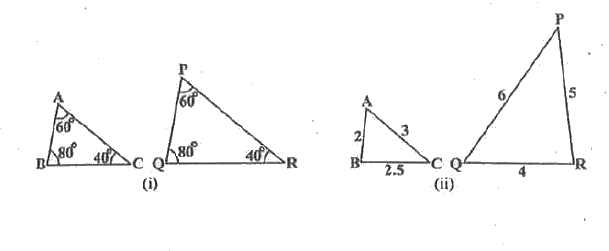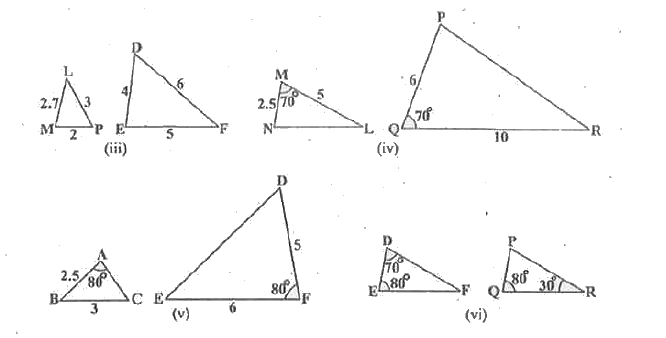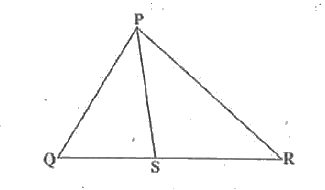E and F are point on the sides PQ and PQ and PR respectively of a ΔPQR .For each of the following cases, state whether ∣∣QR :
PQ = 1.28 cm, PR = 2.56 cm, PE = 0.18 cm and PF = 0.36 cm Solution in Kannada
Step by step video & image solution for E and F are point on the sides PQ and PQ and PR respectively of a DeltaPQR .For each of the following cases, state whether ||QR : PQ = 1.28 cm, PR = 2.56 cm, PE = 0.18 cm and PF = 0.36 cm by Maths experts to help you in doubts & scoring excellent marks in Class 10 exams.
Updated on:21/07/2023Topper's Solved these Questions
- TRIANGLES BOOK - SUBHASH PUBLICATIONCHAPTER - TRIANGLES EXERCISE - EXERCISE 2.3
22 Videos
- TRIANGLES BOOK - SUBHASH PUBLICATIONCHAPTER - TRIANGLES EXERCISE - EXERCISE 2.4
7 Videos
- TRIANGLES BOOK - SUBHASH PUBLICATIONCHAPTER - TRIANGLES EXERCISE - EXERCISE 2.6 (OPTIONAL)
15 Videos
- SURFACE AREAS AND VOLUMES BOOK - SUBHASH PUBLICATIONCHAPTER - SURFACE AREAS AND VOLUMES EXERCISE - EXERCISE 15.5
4 Videos
Similar Questions
State which pairs of triangles in Fig are similar. Write the similarity criterion used by you for answering the question also write the pairs of similar triangles in the symbolic form:


View SolutionLet ΔABC~ΔDEF and their areas be , respectively , 64cm2and121cm2 . If EF = 15.4 cm, find BC
View SolutionIn Fig PS is the bisector of ∠QPR of ΔPQR . Prove that QSSR=PQPR

View SolutionA copper wire, 3mm in diameter , is wound about a cylinder whose length is 12cm, and diameter 10cm, so as to cover the curved surface of the cylinder . Find the length and mass of the wire, assuming the density of copper to be 8.88gpercm3
View SolutionE and F are points on the sides PQ and PR respectively of ΔPQR. For each of the following cases, state whether EF || QR:
(i) PE = 3.9 cm. EQ = 3 cm. PF = 3.6 cm and FR = 2.4
(ii) PE = 4 cm. QE = 4.5 cm. PF = S cm and RF = 9 cm
(iii) PQ = 1.28 cm, PR = 2.56 cm, PE = 0.18 cm and PF = 0.36 cm
View SolutionE and F are points on the sides PQ and PR respectively of ΔPQR. For each of the following state whether EF∣∣QR or not?
PF=1.28 cm, FR=2.56 cm,
PE=1.8 cm and EQ=3.6 cm.
View SolutionE and F are point on the sides PQ and PQ and PR respectively of a ΔPQR .For each of the following cases, state whether ∣∣QR :
PE =3.9 cm , EQ = 3cm , PF = 3.6 cm and FR = 2.4 cm
View SolutionE and F are point on the sides PQ and PQ and PR respectively of a ΔPQR .For each of the following cases, state whether ∣∣QR :
PE = 4 cm , QE = 4.5 cm , PF = 8 cm and RF = 9 cm
View SolutionE and F points respectively triangle PQR's PQ and PR are the overheads. Find out if EF || PQ = 1.28 cm, PR = 2.56 cm, PE = 0.18 cm, PF = 0.36 cm
View SolutionIn triangle ΔPQR, E and F are points on the sides PQ and PR respectively. State whether EF ||QR or not?
(iii) PQ = 1.28 cm PR = 2.56 cm PE = 1.8 cm and PF = 3.6 cm
View SolutionIn triangle ΔPQR, E and F are points on the sides PQ and PR respectively. State whether EF ||QR or not?
(iii) PQ = 1.28 cm PR = 2.56 cm PE = 0.18 cm and PF = 0.36 cm
View SolutionIn triangle ΔPQR, E and F are points on the sides PQ and PR respectively. State whether EF ||QR or not?
(iii) PQ = 1.28 cm PR = 2.56 cm PE = 0.18 cm and PF = 0.36 cm
View SolutionΔPQR की भुजाओ PQ और PR पर क्रमश: बिन्दुये E और F स्थित है | यदि PQ = 1.28cm, PR = 2.56 cm, PE = 0.18 cm और PF = 0.36cm है, तो सिद्ध करे कि EF||QR है |
View SolutionE and F are points on the sides PQ and PR respectively of a ΔPQR. Show that Ef||QR. If PQ = 1.28 cm,PR= 2.56 cm,PE = 0.18 cm and PF= 0.36 cm.
View SolutionIn triangle ΔPQR, E and F are points on the sides PQ and PR respectively. State whether EF ||QR or not?
(iii) PQ = 1.28 cm PR = 2.56 cm PE = 1.8 cm and PF = 3.6 cm
View Solution
